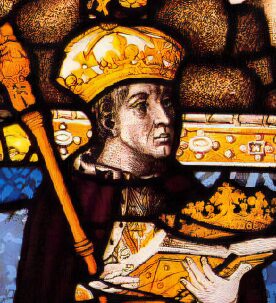
Henry VI
1422-61
The last king of the Lancastrian dynasty, Henry VI was born at Windsor Castle on 6th December, 1421 the son of Henry V and Catherine of Valois, daughter of Charles VI of France. Henry became King of England in his cradle, he was barely nine months old when his famous father, Henry V, died of dysentry on campaign in France. Two months later he became King of France also, when his grandfather, the mentally unstable Charles VI, died.
During Henry's minority, the war in France had been executed loyally and ably by his paternal uncle, John, Duke of Bedford. He struggled with the almost impossible task of retaining his brother's conquests in France. England was ruled by a council lead by Humphrey, Duke of Gloucester, the youngest of Henry V's brothers.
In November 1429, the young king was considered old enough to undergo the arduous coronation ceremony and was crowned at Westminster Abbey at eight years old. The following year, at the age of nine, he crossed to his French kingdom and was crowned King of France at Notre Dame. In the streets of Paris he was observed from an upper storey window by his notorious grandmother, Isabeau of Bavaria, the wanton widow of Charles VI, whom the young king courteously doffed his hat to.
Henry's mother, Catherine of Valois, died in 1437 amidst scandal, when it was discovered that the Dowager Queen had contacted a secret marriage with her Welsh clerk of the wardrobe, Owen Tudor and had borne him several children, three sons and a daughter. Henry later created the eldest of these half-brothers, Edmund and Jasper Tudor, Earls of Richmond and Pembroke respectively. Both were later to play leading parts in the Wars of the Roses, the elder, Edmund was to become the father of King Henry VII, the founder of England's Tudor dynasty. Owen Tudor was summoned before the king's council to explain his conduct, but was released without punishment, he ended his days in 1461, when after fighting on the Lancastrian side at the Battle of Mortimer's Cross, he was beheaded on the orders of Henry's supplanter, Edward IV.
The wheel of fortune had begun to turn against the English in France. Joan of Arc lead the French to victory, and by 1453, all of the great Henry V's conquests, apart from Calais, were lost.
According to the terms of a peace agreement with France, Henry married Margaret of Anjou, daughter of Rene, Duke of Anjou and titular King of Jerusalem and Isabella, Duchess of Lorraine. Margaret was also the niece of the French King, Charles VII. The match was unpopular amongst disaffected elements in England. Margaret, unlike her husband, was a strong headed character, who was unyielding and belligerent, none of which augured well for her future in England.
Henry himself was a gentle, devout and kindly man, but early in his reign is said to have been "unsteadfast of wit". He did not appear to enjoy wearing the magnificent clothing expected of a sovereign and often dressed simply "like a farmer". Unlike his warlike father, Henry possessed a strong aversion to violence and was deeply, even obsessively, devoted to religion.
No comments:
Post a Comment